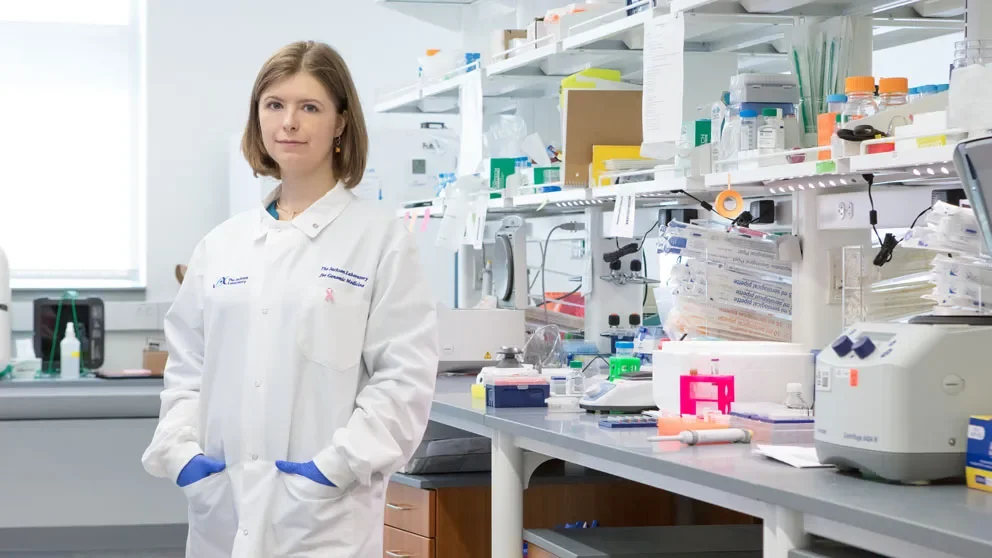V Foundation funds JAX cancer research for third straight year
Article | November 13, 2018
Armed with new funding from the V Foundation, Olga Anczuków-Camarda, Ph.D., is uncovering genetic changes in the breast, paving the road to early cancer detection and prevention.
According to the American Cancer Society, nearly 80 percent of all breast cancers occur in women older than age 50. This makes age the greatest risk factor for being diagnosed with breast cancer. Mammary tissues change as we age, but the biological mechanisms behind these changes require further exploration.
Is it possible that the link between aging and breast cancer lies in one of these mechanisms?
Anczuków, Assistant Professor at The Jackson Laboratory (JAX), is hopeful that she may have found one such link inalternative RNA splicing.
Alternative RNA splicing is a process that occurs in our cells, similar to that of film editing for a movie producer. During alternative RNA splicing, our cells ‘cut and trim’ information from our genetic profile, producing different proteins, or isoforms.
where-the-silver-screen-meets-the-genome
“Alternative RNA splicing is such a critical step in gene expression regulation,” says Anczuków. “We know a lot about it from a mechanistic point of view, but it has been underexplored in the development of normal tissues as well as in diseases.”
With the support of a 2018 V Scholar grant, Anczuków’s lab aims to answer two questions:
- What changes in alternative RNA splicing in aging breast tissues?
- Do these changes act as a precursor to breast cancer development?
The V Scholar grant was awarded to Anczuków two years into her research career at JAX. Funded by the V Foundation, the two-year grant aims to support young tenure-track faculty with laboratory-based fundamental and translational research. Anczuków will utilize her grant, along with her unique expertise, to characterize RNA splicing misregulation in breast tissues and hopefully find unique biomarkers for breast cancer development.
Anczuków believes this work has the power to change the world of breast cancer treatment. “In the long term, our research findings have the potential to identify novel strategies to delay or prevent changes in the breast that lead to tumor formation,” she says. “The ultimate goal is to identify novel strategies for early breast cancer detection, early intervention, and prevention.”
To learn what changes occur in alternative RNA splicing in aging breast tissues, Anczuków’s lab is monitoring protein isoforms in the mammary gland of young mice and comparing them to those of old mice. This mouse model data could be translated into something clinically useful for doctors and patients: biomarkers, or ‘checkpoints’, for breast cancer development.
“In the short-term, our research will help researchers understand how aging affects the breast tissue, and why women are more likely to develop breast cancer as they grew older,” said Anczuków. “In the medium term, findings from our research may lead to the development of a panel of molecular markers that would be used to detect and diagnosis breast cancer much earlier than currently done in the clinic.”
This is the third straight year a JAX researcher has received a V Scholar award.
Preserving fertility for women battling cancer
For female cancer patients of reproductive age, radiation and chemotherapy treatments pose a threat to fertility. Cancer researcher and 2017 V Scholar recipient Ewelina Bolcun-Filas, Ph.D., is working to preserve these patients’ fertility by harnessing a natural process that prevents DNA damage to oocytes — the cells that develop into eggs.
Her work is advancing the development of drugs to prevent infertility caused by cancer-treating radiation.
“Our main goal is to identify egg-saving treatments that can be used along with standard cancer therapies,” says Bolcun-Filas.
Targeting acute myeloid leukemia before it starts
As we age, we grow more likely to develop cancer. In her lab, 2016 V Scholar recipient Jennifer Trowbridge, Ph.D., wants to know why older people are more likely to get acute myeloid leukemia (AML). She is investigating aging stem cells that should be building blood cells but are developing cancer cells instead.
As with all cancer, the earlier this leukemia is detected, the better the outcome for the patient. Trowbridge has figured out a way to profile blood tumor cells that offer a powerful new prognostic tool, allowing doctors to target AML before it takes hold in patients.
“Our main goal from this work is to help assess patients’ disease risk and minimize the rate of post-treatment relapse,” says Trowbridge.
